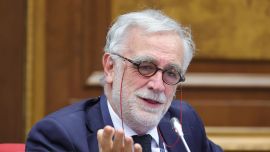After announcing Argentina’s application to join the BRICS group of emerging market economies had been approved, President Alberto Fernández granted an exclusive interview to Radio Perfil and NET TV show Modo Fontevecchia.
[Juan Domingo] Perón said that true politics was international politics. Could we say that Argentina entering BRICS is the result of a relationship whose foundation you have been laying and developing with [Luiz Inácio] Lula [da Silva] and Brazil?
There’s a bit of that, but it’s much more, it’s the collective work of a lot of people. I myself formally suggested this starting in 2022 to pro-tempore President Xi Jinping, Argentina’s willingness to enter BRICS, and then came quite complex formalities between partners, not only given the difficulty to enter, but also because founding partners could not agree on a system to integrate new partners. There are over 67 countries who have asked to join BRICS.
Over the last few years, we’ve also had singular milestones, we continue to work hard for Latin American integration, we have rebuilt CELAC [Community of Latin American and Caribbean States] and presided over it for a year, we have worked a lot to make the EU-CELAC summit happen, but that didn’t mean skipping a visit to [US President Joe] Biden at the Oval Office of the White House and voicing our concerns, nor did it prevent us from presiding over the UNHRC [United Nations Human Rights Council] and from creating all our links with the European Union and such European countries as France, Germany, Italy, Spain and Portugal. We paid special attention to this because ultimately, we live in a globalised world and nobody can find isolated solutions, they’re found jointly.
I feel today we have taken an important step, because what is perhaps not taken into account is that today’s partners of BRICS account for 36 percent of the gross world product.
And 70% of our exports.
That’s also true, but all of us who are a part of BRICS now accounting for 36 percent of the gross world product means we represent more than the G7, which accounts for 31 percent.
But there is also something one can’t avoid, BRICS as it is today has 40 percent of the world population, and it means being able to access 40 percent of major markets. That’s why I say that today we’ve taken a truly essential step for Argentina, it’s a huge opportunity and we mustn’t waste it.
In such a presidential country, what led you to keep such a low profile over the last few months in domestic politics?
The truth is I didn’t keep a low profile, I decided not to run and support Sergio [Massa] with everything he needs and I’ve said so publicly. But I also have to keep in mind that I have to govern until December 10, and I feel we had items on the to-do list which forced me to work behind the scenes.
After that the media started speculating that when one does that, one is avoiding the limelight, and the truth is I let the election go by and got back in touch with people on public outings.
There is also media speculation about what my schedule looks like.
We’ve still been working full-time all the while with all the problems we have to face, both international and local, and there are many.
I believe that’s my role right now and I have to fulfil it.
I heard you yesterday at a rally, where you said you as a democrat believe ballot boxes are always right. I would like you to share with our audience, how do you account for [Javier] Milei’s triumph?
I have a feeling there are many people who over the last four years, for multiple reasons, have felt their needs have not been met. I believe the pandemic psychologically affected many, it discouraged people, and the inherited debt – plus the pandemic, plus the war which triggers an inflationary process in the world, plus the drought – is a combo that more easily discourages a society suffering from all those things.
I think with an anti-system or anti-politics speech, Milei managed to capture a third of the citizenry, now divided into three-thirds, that’s the truth. He hasn’t won the Presidency, he has managed to rack up 30 percent of the votes. People who haven’t paid much attention to the substantive issues he talks about have found in him a channel to express their unrest, and I understand that unrest.
I get it, and over the last few years I have made every effort and I have achieved some results which are not seen or not shown, or just this constant dejection. But Argentina has grown by 16 percent the last two years.
Why do you think Milei managed to capitalise on that discouragement better than Juntos por el Cambio?
I have the impression that the collective memory distinctly recalls the disaster left by Macri, and the candidates running to represent that front were his two best students. Therefore, if one wants to express unrest with reality, Macri’s reality is very present.
We saw that yesterday when we finished negotiating with the Fund, the conditions and limitations they impose, and how that affects Argentine prosperity.
But not in 2021? Because Juntos por el Cambio won the election.
Yes, but Milei wasn’t a candidate then. He didn’t leave the mark he has now as an anti-system option. My impression is that, with all due respect to Milei, I think that’s the idea he wishes to represent, the caste idea. That idea catching on with many people who don’t realise that the biggest defender of the caste in Argentina is Milei, and perhaps they don’t understand or don’t pay attention, people maybe don’t realise that talking about dollarising the economy, opening all imports, eliminating social housing and public works, all that defends powerful sectors in Argentina. The true caste.
Patricia Bullrich’s triumph in the Juntos por el Cambio primary, different from 2021 when the moderate wing of JxC won with Horacio Rodríguez Larreta, does it show part of Argentine society sliding towards the right, not only in the form of Milei but also Bullrich?
I don’t know, I don’t know if people vote so much right-wing or left-wing, I don’t understand that very well. I don’t know if that type of politics is still valid.
Macri’s public eye is on Milei, could that indicate that Macri might even prefer Milei’s victory because the libertarian’s ideas show him in an even better light?
Well, that's what they're saying, right? Today, Macri is Milei and Milei is Macri.
If Milei knew how Macri is viewed in the world he would be more careful, but he said he will hold him as a representative of Argentina to the world, a sort of ambassador-at-large. Milei says that, and Macri smiles, he makes it public.
Massa seems to be more your candidate rather than Cristina Fernández de Kirchner, who preferred [Eduardo] ‘Wado’ de Pedro. Is it fair to say that La Cámpora’s strategy was to focus on Buenos Aires Province so as not to feel responsible if a potential presidential defeat happened, thus remaining the sole winner in Buenos Aires Province?
I think behind that there is plenty of speculation and political analysis.
What I do believe is that this year we have been in a democracy for 40 years, and after 40 years we have to think things through. I know there are many kids born in a democracy, thank God, who haven’t known what it’s like to live during a dictatorship, they haven’t experienced authoritarianism, but now there are many things at stake, the rights of minorities, aboriginal peoples, women, which were so hard to earn and someone comes and questions them, the rights of gay communities, the rights of workers, and people come and say we have to repeal labour legislation and make it more flexible, which makes all those rights disappear.
Was this latest 20 percent devaluation [of the peso] imposed by the Fund, and did you agree with it? Clearly, it does not seem to have been a positive measure in any sense.
It was a recurrent demand from the Fund, without any doubt, it wanted a much larger devaluation, and we hope that with this devaluation, which was smaller than what the Fund was asking for, we can close the gap between the dollars.
If you look at the dollars [exchange rate], we cut the gap a lot. What happens is that then there is the famous ‘blue dollar,’ which is an unmanageable market in the way it works.
To help people understand, the devaluation came and, in 48 hours, they took the dollar from 600 to 806 pesos, and in two days it went down to 720 pesos. Someone made a big deal and many people lost a lot of money with that move, that's all speculation.
Now, if Argentina continues to look at the ‘blue dollar,’ it is wrong. You have to look at the gaps between the official dollars, the MEP, the CCL, there the gaps have narrowed absolutely.
To what do you attribute the looting and supermarket robberies?
To the fact that some people took advantage of a difficult moment and the election results to stir things up for the purpose of robberies and for some political purposes. I was very concerned and very surprised that it started in Mendoza, Neuquén and Río Cuarto.
I spoke to the governor of Mendoza, who made statements about organised robberies, not looting, that there was a whole organisation and that they have detected the WhatsApp accounts. Yesterday I was with the governor of Neuquén, and he explained exactly the same thing to me, that they have detected the accounts from where [the robbers] they mobilised. Here, with cyber intelligence we detected the same things, and I think that many of the people [who have been] arrested have criminal records.
I think it was like an impulse where some people took advantage of the moment and said ‘Let's take advantage now and do this,’ to generate destabilisation.
To say that we are living a new 2001 is a very serious thing, and for a presidential candidate to say so is extremely serious, because in 2001 there were not five points of unemployment, there were 18, we were not coming from an Argentina that grew 16 points in the last two years, we were coming from five years of recession, we were coming from a corralito that had taken the people's money, and none of that is happening in Argentina [today].
Would you change anything about your relationship with Cristina Fernández de Kirchner?
No, I would have liked to have a better understanding, but that is part of history.
I have respect and affection for her beyond the differences we have. She is a victim of an unforgivable persecution and I try to generate stable and lasting bonds of coexistence with everyone, and that is also important to me.
How do you imagine your personal and political future?
I get asked that question a lot and for me the tenth of December is still a long way off, and I have so much to do in between.
Bullrich said that with her as president Argentina would leave the BRICS. What do you think?
I hope she is not president, because she doesn't understand what she is saying. The problem is when foreign policy begins to ideologise, and foreign policy has no ideologies.
As a dog lover, do you find Milei's relationship with his dogs perplexing?
I must confess that when I met him once, before all this, he told me about his love for dogs. I think it's wonderful that he loves dogs, because dogs are kind beings, for me [the president's dog] Dylan is a friend of mine, I love him dearly, and it's true that when he looks at me he transmits something to me. But I don't talk to my dog, that's not the relationship that you have with your dog.
It seems to me that maybe it denotes something of his characteristics, that he says the things he said. At that time I remember he told me that he had a dog called Conan and that he had cloned him to have him again the day he died, and it caught my attention.
* Edited transcript of extended interview.




















Comments